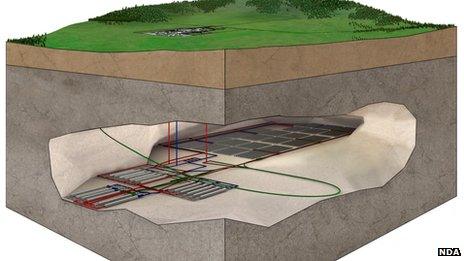Cumbria nuclear project rejected by councillors
- Published

Radioactive waste can be stored in underground vaults at a depth of between 200m (656ft) and 1,000m (3,280ft)
Plans to look for a site for a £12bn underground nuclear waste store in Cumbria have been rejected.
Cumbria County Council vetoed an advanced "stage four" search for a site for the radioactive waste facility.
The stage included detailed geological investigations and discussions over the social and economic implications.
The Department for Energy and Climate Change said it was "disappointed" but the no vote would not "undermine" the long-term disposal of nuclear waste.
There were huge cheers from environmental campaigners outside the council chamber in Carlisle when the decision was announced.
The 10 members of the county council's cabinet voted seven to three against continuing with the plans.
'Uncertainty and worry'
The decision effectively ends Cumbria County Council's four-year formal involvement in the process to find an underground repository for high-level nuclear waste.
Council leader Eddie Martin said: "Cabinet believes there is sufficient doubt around the suitability of West Cumbria's geology to put an end now to the uncertainty and worry this is causing for our communities.
"Cumbria is not the best place geologically in the UK and the government's efforts need to be focused on disposing of the waste underground in the safest place, not the easiest.
"Members have remained concerned throughout on the issue of the legal right of withdrawal if we proceed to the next stage.
"Cumbria has a unique and world-renowned landscape which needs to be cherished and protected. While Sellafield and the Lake District have co-existed side by side successfully for decades, we fear that if the area becomes known in the national conscience as the place where nuclear waste is stored underground, the Lake District's reputation may not be so resilient."
Earlier the authority ruled out Allerdale Borough Council's own vote on the issue, whilst Copeland Borough Council had voted in favour.
Dr Ruth Balogh, nuclear issues campaigner for West Cumbria and North Lakes Friends of the Earth, said she was "absolutely delighted".
"Our representatives have truly represented the communities of west Cumbria and voted against this option," she said.
"The problems of nuclear waste and where to put it is a UK problem and should not be pushed onto the people of Cumbria."
'Go it alone'
Leaders of Copeland Borough Council had voted six to one in favour of moving to the next stage, but could only proceed if the county council also agreed.
However, Copeland council leader Elaine Woodburn said the authority would be writing to the government confirming its willingness to "go it alone" and seek out a suitable underground site.
Ed Davey, Secretary for Energy and Climate Change, said: "While the decision to withdraw is disappointing, Cumbria will continue to play a central role in the energy and nuclear power sectors.
Eddie Martin, Cumbria County Council: "Would anyone come to Cumbria if you were even thinking of building a nuclear waste storage facility here?"
"We are clear that nuclear power should play a key role in our future energy mix, as it does today.
"I am confident that the programme to manage radioactive waste safely will ultimately be successful, and that the decisions made in Cumbria will not undermine prospects for new nuclear power stations.
"It is however absolutely vital that we get to grips with our national nuclear legacy. The issue has been kicked into the long-grass for far too long.
"We remain firmly committed to geological disposal as the right policy for the long-term, safe and secure management of radioactive waste."
- Published29 January 2013
- Published28 January 2013
- Published26 January 2013
- Published25 January 2013
- Published7 November 2012
- Published3 November 2010
- Published8 October 2012